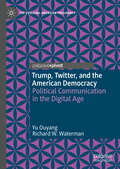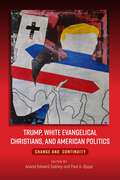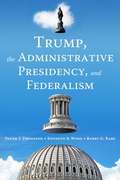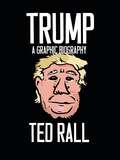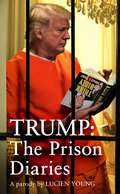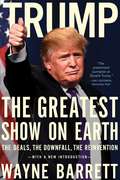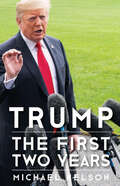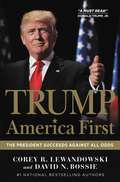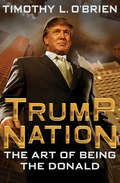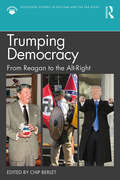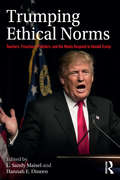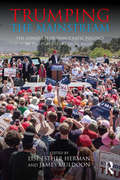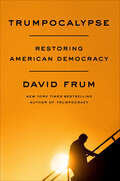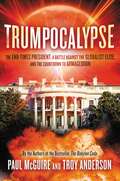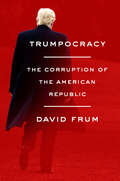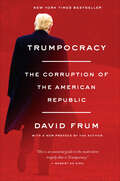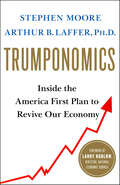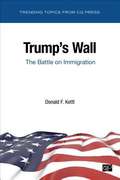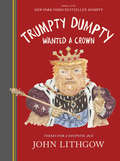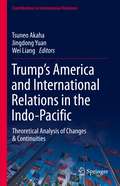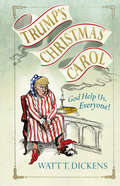- Table View
- List View
Trump, Twitter, and the American Democracy: Political Communication in the Digital Age (The Evolving American Presidency)
by Yu Ouyang Richard W. WatermanThis book takes a social science approach to address two related questions: (1) what does Donald Trump say on Twitter? and (2) why? Since entering the 2016 Presidential Election, Donald Trump’s tweets have been a major part of his communications strategy with the public. While the popular media has devoted considerable attention to selected tweets, it is less clear what those selected tweets tell us about Trump the businessman, the political candidate, and, finally, the President of the United States. We argue that to fully understand Trump, we must take a more comprehensive approach to examining all of his activities on Twitter. Overall, our analysis presents a strikingly complex picture of Trump and how he uses Twitter. Not only has his pattern of tweets changed over time, we find that Trump’s use of Twitter is more deliberate than he has been given credit. Like most other politicians, Trump is strategically-minded about his presence on social media.
Trump, White Evangelical Christians, and American Politics: Change and Continuity
by Anand Edward Sokhey and Paul A. DjupeIn Trump, White Evangelical Christians, and American Politics, political scientists Anand Edward Sokhey and Paul A. Djupe bring together a wide range of scholars and writers to examine the relationship between former President Donald Trump and white American evangelical Christians. They argue that, while this relationship—which saw evangelicals supporting a famously unfaithful, materialistic, and irreligious candidate despite self-defining in opposition to these characteristics—prompted many to wonder if Trump himself transformed American evangelical religion in politics, this alliance reflected both change and the outcome of dynamics that were in place or building for decades.Contributors contextualize the Trump presidency within the story of religious demographic change, the growth of politicized religion, nationalistic religious expression, and the ways religion and politics in the United States are enmeshed in the politics of race. These investigations find that the idea of religious “transformation” is not accurate. Instead, the years 2015 to 2022 saw mainly minor changes to the ways religion appeared in public life—but these changes ultimately complemented and advanced an existing white evangelical strategy to increase political and social power as they became a demographic minority in the United States. Taken together, this collection reveals new insights for readers seeking to understand the religious dimensions of Trump’s rise, the reasons evangelicals become political activists, and the multifaceted alliances between secular politicians and conservative religious subcultures.Contributors: Abraham Barranca, Ruth Braunstein, Ryan P. Burge, David E. Campbell, Jeremiah J. Castle, Paul A. Djupe, John C. Green, Sarah Heise, Geoffrey C. Layman, Andrew R. Lewis, Gerardo Martí, Eric L. McDaniel, Napp Nazworth, Shayla F. Olson, Enrique Quezada-Llanes, Kaylynn Sims, Anand Edward Sokhey, Hilde Løvdal Stephens, Kyla K. Stepp, Allan Tellis.
Trump, the Administrative Presidency, and Federalism
by Barry G. Rabe Kenneth K. Wong Frank J. ThompsonThis book analyzes the dynamics and unique qualities of Trump's administrative presidency in the important policy areas of health care, education, and climate change. In each of these spheres, the arrival of the Trump administration represented a hostile takeover in which White House policy goals departed sharply from the more “liberal “ ideologies and objectives of key agencies, which had been embraced by the Obama administration.
Trump, the Blue-Collar President
by Anthony ScaramucciIn an administration not known for its subtlety, no comet soared higher, burned brighter, or flamed out more spectacularly than Anthony Scaramucci. For eleven days (not ten, as widely reported, he'll tell anyone who'll listen) he ran the most important communications department in the world, the White House's. By the end of his short tenure -- several of the most tumultuous and formative days of the Trump administration -- he'd gone from a fairly well known on-air surrogate for the president to a household name, "the Mooch." The rise and fall of the Mooch, which riveted the nation, unfolded like a Shakespearean play directed by Martin Scorsese. In his own inimitable voice, Anthony reveals the juicy details behind his stormy term as White House communications director. He holds nothing back and spares no one's feelings-including those of the country's most powerful people. If political movements are best understood through a single human life, then there is no better life to tell the story of Donald Trump's rise in America than the Mooch's.From Long Island Newsday paperboy, with the largest route in Port Washington, to Master of the Universe, as Tom Wolfe characterized his kind in Bonfire of the Vanities, Anthony's life was the embodiment of the American Dream. By his own admission, however, he became so involved in his high-octane career and life that he forgot his working-class roots. He wasn't the only one to ignore the working class. There were neighborhoods like the one he grew up in throughout the country filled with deflated, unemployed, or underpaid people, ignored by elites and politicians-until Donald Trump came along.It was only when Anthony joined the Donald Trump for President campaign as a surrogate and economic advisor that his eyes were opened to the plight of our country's middle class. It took a billionaire real estate developer who lived in a tower on Fifth Ave to show him what had happened to the neighborhood in which he'd grown up and communities like it throughout America. It was then that Anthony realized that Donald Trump and his economic policies were the best bet for our country's future. A romp of a read, by turns hilarious, touching, and inspiring, Trump, the Blue-Collar President is sure to be among the best books written about the Trump presidency.
Trump: 100 días en 5 momentos (Flash Ensayo)
by Eduardo Suárez María RamírezLos primeros cien días de Trump en cinco grandes momentos. #Trump100 Los primeros cien días en la Casa Blanca son un periodo crucial para todo presidente estadounidense porque es cuando se fijan las prioridades y se ponen en marcha las principales reformas que marcarán la ruta del nuevo gobierno. Esta brillante crónica de Eduardo Suárez y María Ramírez resume en cinco momentos clave la presidencia más polémica y desoladora de la historia reciente de Estados Unidos.
Trump: A Graphic Biography
by Ted RallReal Estate Billionaire. Reality TV star. President?Donald Trump inherited a fortune from his father. But he wanted more.Shrewd and indefatigable, he never missed an opportunity to expand his holdings. He transformed himself into an international brand. He marketed his personality into a product. He built an empire. But that wasn&’t enough. He wanted to be President, and he was willing to do and say whatever it took.Donald Trump, who never held political office, pulled off his ultimate acquisition: the hostile takeover of the Republican Party. Everyone was shocked — except those who knew him.
Trump: MAKE PRISON GREAT AGAIN with the funniest satire of the year
by Lucien YoungIn this explosive first-person account of swapping the White House for the Big House, Donald Trump aims to Make Prison Great Again.MARCH 31It's been two weeks since they put me in The Hole. Very unfair! No-one is treated as unfairly as Trump. Many people say that solitary confinement is a kind of torture. I'm not so sure. I'm getting to spend a lot of time with my favourite person in the world. I say to him: "Mr President, remember when you met Bo Derek at the PGA Tour Championship? She had the hots for you, believe me." And he'll reply: "I agree, Mr President. Also, I was a better golfer than anyone in the tournament.And that's without cheating, which I would never do, believe me."So I'm doing amazing. Incredibly well. Some would say I'm the best Hole Guy ever. Not like those losers who go nuts...Of course the verdict was VERY UNFAIR - they were meant to be a jury of his peers, but none of them were billionaires. Still, the trial got AMAZING ratings. Now locked up in Smallhand State Prison, our presidential protagonist goes full Samuel Pepys and attempts the first BESTSELLER to be written entirely on toilet paper.Life inside is tough for Trump: he experiences withdrawal symptoms from social media and is no longer able to watch Fox News all day. But he soon realises that incarceration isn't a punishment, it's an OPPORTUNITY, and attempts to conquer the clink as he once conquered AMERICA. Can Donald rise to become prison kingpin, smuggling McDonald's Filet-O-Fish and tutoring fellow inmates in the Art of the Deal?Interspersed with reports from Smallhand's resident psychologist, Trump: The Prison Diaries is a satirical riot - The Apprentice meets The Shawshank Redemption. So brace yourself, because orange is the new orange.
Trump: MAKE PRISON GREAT AGAIN with the funniest satire of the year
by Lucien YoungIn this explosive first-person account of swapping the White House for the Big House, Donald Trump aims to Make Prison Great Again.MARCH 31It's been two weeks since they put me in The Hole. Very unfair! No-one is treated as unfairly as Trump. Many people say that solitary confinement is a kind of torture. I'm not so sure. I'm getting to spend a lot of time with my favourite person in the world. I say to him: "Mr President, remember when you met Bo Derek at the PGA Tour Championship? She had the hots for you, believe me." And he'll reply: "I agree, Mr President. Also, I was a better golfer than anyone in the tournament.And that's without cheating, which I would never do, believe me."So I'm doing amazing. Incredibly well. Some would say I'm the best Hole Guy ever. Not like those losers who go nuts...Of course the verdict was VERY UNFAIR - they were meant to be a jury of his peers, but none of them were billionaires. Still, the trial got AMAZING ratings. Now locked up in Smallhand State Prison, our presidential protagonist goes full Samuel Pepys and attempts the first BESTSELLER to be written entirely on toilet paper.Life inside is tough for Trump: he experiences withdrawal symptoms from social media and is no longer able to watch Fox News all day. But he soon realises that incarceration isn't a punishment, it's an OPPORTUNITY, and attempts to conquer the clink as he once conquered AMERICA. Can Donald rise to become prison kingpin, smuggling McDonald's Filet-O-Fish and tutoring fellow inmates in the Art of the Deal?Interspersed with reports from Smallhand's resident psychologist, Trump: The Prison Diaries is a satirical riot - The Apprentice meets The Shawshank Redemption. So brace yourself, because orange is the new orange.
Trump: The Deals, the Downfall, the Reinvention
by Wayne BarrettThe essential book to understanding Donald Trump as a businessman and leader--and how the biggest deal of his life went down. Now, Barrett's classic book is back in print for the first time in years and with an introduction about Trump's 2016 presidential campaign. Donald Trump claims that his success as a "self-made" businessman and real estate developer proves that he will make an effective president, but this devastating investigative account by legendary reporter Wayne Barrett proves otherwise. Back in print for the first time in years, Barrett's seminal book reveals how Trump put together the biggest deal of his life--Trump Tower--through manipulation and deceit; how he worked with questionable characters from the mafia and city politics; and how it all nearly came crashing down. Here is a vivid and inglorious portrait of the man who wants now to be the most powerful man in the world. In Trump: The Greatest Show in the World--The Deals, the Downfall, the Deals, Barrett unravels the myth and reveals the truth behind the mogul's wheelings and dealings. After decades covering him, few reporters know Trump as Barrett does. Instead of the canny businessman that Trump claims in his own books, Barrett explores how Trump exploited his father's banking and political connections to finance and grease his first major deals. Barrett's investigative biography takes us from the days of Donald's lonely youth to his brash entry into the real estate market, and to the back room deals behind his New York, Atlantic City and Florida projects. Most compellingly Barrett paints an intimate portrait of Trump himself, a man driven by bravado, obsessive self-regard, and an anxious ruthlessness to subdue his rivals and seduce anyone with the power to aid his empire. We see him head to head with an opponent as powerful as Pete Rozelle, ingratiating himself with the brooding governor on the Hudson, and fueling the Drexel engine driven by Michael Milken with hundreds of millions in fees--paid, ironically, by gaming companies to fend off Trump takeovers. We explore his complicated emotional and business relationship with his first wife, Ivana, and the use he planned to make of his mistress--and later, his second wife--Marla Maples as a "southern strategy" in his then contemplated presidential campaign. With interviews with scores of adversaries and former colleagues, we are given a privileged look at Trump the businessman in action--reckless as often as he is brilliant, reliant on threats as much as on charm, and ultimately a cautionary tale: is this the man we want to lead the world? PRAISE FOR TRUMP: "Trump is a withering portrait of the most self-mythologized and promoted businessman of our era, an exhaustively researched and long-overdue antidote to Trump's own books. It is a penetrating portrait of the age that spawned him and the many who aided and abetted his rise. Trump seems destined to be the definitive account of how Trump got ahead and why he fell. It is a sad story, with important lessons for us all." --James B. Stewart, Pulitzer Prize-winning author of Den of Thieves "Donald Trump surprises us again. Wayne Barrett's Trump is a fresh, detailed, and vivid account of the tangled connections of money, politics, and power in our times." --Nicholas Pileggi, author of Wiseguy
Trump: The First Two Years (Miller Center Studies on the Presidency)
by Michael NelsonOn the first anniversary of Donald Trump’s presidency, Michael Nelson, one of our finest and most objective presidential scholars, published Trump’s First Year, a nonpartisan assessment that was widely hailed as the best account of one of the most unusual years in presidential history. At the midpoint of Trump’s term, Nelson has updated his book to include the second year, which if anything has proven to be even more remarkable.Beginning with an examination of the dramatic 2016 election, Nelson’s book follows Trump as he takes office under mostly favorable conditions, with relative stability at home and abroad and his party in control of both houses of Congress. Trump leveraged this successfully in some ways, from the confirmation of his nominee Neil Gorsuch to the Supreme Court to the passage of his tax-reform bill. But many more actions were perceived as failures or even threats to a safe, functional democracy, including immigration policies defied by state and local governments, volatile dealings with North Korea, unsuccessful attempts to pass major legislation, and the inability to fill government positions or maintain consistent White House staff.As Nelson demonstrates in a substantial addition to the original book, Trump’s effectiveness, or lack thereof, did not change significantly in his second year in office, but his approach often did. With the Mueller investigation and the midterm elections looming, Trump threw off his advisors’ restraints and acted more directly on his impulses, reverting to the instincts and rhetoric that had won him the election. While opposition to Trump remained strong in many quarters, resistance among GOP leaders crumbled as they were confronted with their constituents’ support of the president.Published on the second anniversary of Trump’s inauguration, Nelson’s book offers the most complete and up-to-date assessment of this still-unfolding story.Praise for the first edition:"Measured, scholarly, and always accessible, this is a cogent analysis of the first year of the Trump presidency."--the Independent" Trump’s First Year won't generate the bombshell headlines of more sensationalist and gossipy books, but it provides context and balance for its conclusions, ones that are consistently at odds with Trump's own assessment of his performance."--Kirkus Reviews"Providing one of the earliest objective evaluations of President Donald J. Trump’s administration, Nelson demonstrates why he remains a leading figure in the field of presidency studies."--Choice
Trump: The President Succeeds Against All Odds
by Corey R. Lewandowski David N. BossieNew York Times bestselling authors and close advisors to the president Corey R. Lewandowski and David N. Bossie write from the front lines of Trump's battle to keep America great.Trump: America First gives the reader a firsthand and inside account of the Trump administration's battle for the soul of America. As we face the most critical presidential election of our lifetimes, we find ourselves buried in an avalanche of political spin, candidate talking points, and slick campaign ads. Then, just as you're ready to give up, along comes a book that makes sense of a political time like none that have come before.Written with the urgency of a countdown and by President Trump's two top outside political advisors and friends, Corey R. Lewandowski and David N. Bossie, Trump: America First blasts through the nonsense to deliver a first-hand account of the Trump presidency and reelection campaign during its most tumultuous time. From the COVID-19 shutdown in March to the campaign leadership shakeup and reset in July, Lewandowski and Bossie are present for every big moment, and now the reader is too. With unprecedented access to President Trump, the authors take us inside the Oval Office, aboard Air Force One, and backstage at Trump rallies. As they did in their first two blockbuster New York Times bestsellers, Lewandowski and Bossie show a side of the president few get to see. Along the way, Lewandowski and Bossie also tell of their own battles with the forces aligned against the president, and bring us inside the White House to the rough-and-tumble world of Trump's West Wing.Trump: America First also makes a case for electing Donald Trump to a second term. From revamping our trade with China to replacing NAFTA, from NATO to Kim Jong Un, Donald Trump leaves Joe Biden in the dust. Written with the authors' usual wit and political insight, America First is truly a book a political book for our time.
Trump: The Presidential Photographs
by William MorrowThe definitive visual portrait of Donald J. Trump’s presidency, as seen through the lens of the Official White House Photographers.Selecting the finest images from the White House collection, Trump: A Presidential Portrait is a stunning all-access pass to the 45th presidency. These historic photos portray both the grandest and most intimate moments, offering an insider’s look beyond the gates of the White House, and behind closed doors of the Oval Office, the Situation Room, and Air Force One, as well as President Trump’s official trips across the nation and the world.Accompanied by quotations from the president’s speeches, Trump: A Presidential Portrait offers a unique window of many of the most consequential events of the Trump administration: the appointments of Supreme Court Justices Neil Gorsuch and Brett Kavanaugh, the construction of the border wall, the White House Situation Room on the day of the raid that killed ISIS leader al-Baghdadi, the seventy-fifth anniversary commemoration of D-Day, and leadership of the nation’s response to the coronavirus pandemic. We also see President Trump perform the solemn duties of the commander-in-chief: addressing the troops at military bases across the globe, awarding the Medal of Honor, visiting Arlington National Cemetery, bearing witness in the aftermath of natural disasters. And there are intimate, private scenes of the President and First Lady at the White House, as they entertain foreign dignitaries and share quiet moments with family.Featuring more than 250 photographs in gorgeous full-color, here is the first book to gather the official photographs of the Trump White House—and an essential visual documentary of American history.
TrumpNation: The Art of Being The Donald
by Timothy L. O'BrienDonald Trump called this book "terribly written," sued the author for $5 billion--and lost. For anyone wondering what life might be like under President Trump, this field guide through TrumpNation offers a probing, often hilarious, and thoroughly definitive account of the man behind the hype. Available for the first time in a decade, with a new introduction by the author, this myth-busting look inside the world of Donald Trump is chock full of rip-roaring anecdotes, jaw-dropping quotes, and rigorous research into the business deals, political antics, curious relationships, and complex background of the leading Republican presidential candidate. Granted unprecedented access, Timothy L. O'Brien traveled across the country and up and down the East Coast with Trump on his private jet, wheeled around Palm Beach with him in his Ferrari, and spent hours interviewing him in his home, in his office, and on the golf course. He met with the entrepreneur's closest friends and most aggressive rivals, while compiling a treasure trove of Trumpisms from the Donald himself: Trump on the public's enduring fascination with Trump: "There is something crazy, hot, a phenomenon out there about me, but I'm not sure I can define it and I'm not sure I want to." Trump on naysayers: "You can go ahead and speak to guys who have four-hundred-pound wives at home who are jealous of me, but the guys who really know me know I'm a great builder." Trump on the art of self-promotion: "You might as well tell people how great you are, because no one else is going to." Ultimately, when O'Brien's research revealed that Trump's business record and annual spot on the Forbes 400 list of richest Americans might be more fantasy than reality, he--like so many others who have dared to tangle with the former host of The Apprentice--found himself in a courtroom. In a new introduction, O'Brien reflects on the recent wave of TrumpMania and updates readers on what it's like to depose one of the world's most litigious businessmen--and win. Be careful what you wish for, America, because--spoiler alert!--the Donald is a sore loser.
Trumping Democracy: From Reagan to the Alt-Right (Routledge Studies in Fascism and the Far Right)
by Chip BerletSince 2014, over 80 people have been killed in the United States of America by Right-wing terrorists. In 2016 Donald Trump was elected President of the United States and received substantial support from White nationalists. This book explains the increase in violent White nationalism and Trump’s ascendancy in the context of the backlash against the presidency of Barack Obama. It demonstrates how there is a dynamic relationship between the Republican Party, various Right-wing populist movements, and the Right. Far Right social movements, political campaigns and the online presence of the so-called ‘alt-Right’ are all discussed. The book argues that unfair hierarchies of race, gender, and class are not aberrational tremors in America, but the fracturing bedrock of a nation in which being White, male, Christian, or straight no longer ensures a stable floor for power, status, or privilege. This is vital reading for students, researchers, and activists interested in American politics and the dangers of Right-wing movements and political parties.
Trumping Ethical Norms: Teachers, Preachers, Pollsters, and the Media Respond to Donald Trump
by L. Sandy Maisel Hannah E. DineenQuestions of ethics and politics have a long tradition in the classroom as well as the political world. Those who act in the political realm—including the media, political strategists and consultants, educators, and religious leaders—are in professions for which a clear code of conduct or an accepted set of ethical norms exists. By contrast, Donald J. Trump, as candidate and as President, has upended the political and ethical context in which he and others operate. This book explores emerging ethical questions that face professionals interacting with a new executive order. Some say the age of Trump is unique and that the norms of ethical professional behavior must be bent to meet this challenge. Others maintain that responding to someone like Trump is precisely why their profession has ethical norms, and that they must put their judgments on hold and respond in what has always been deemed the appropriate professional manner. Each chapter opens with an introduction setting the framework of ethical analysis for a particular profession, is followed by original contributions by notable practitioners, and concludes with a set of questions for students and other readers to ponder and discuss.
Trumping the Mainstream: The Conquest of Democratic Politics by the Populist Radical Right (Extremism and Democracy)
by James Muldoon Lise Esther HermanIn 2016, the striking electoral success of the UK Vote Leave campaign and Donald Trump’s presidential bid defied conventional expectations and transformed the political landscape. Considered together, these two largely unpredicted events constitute a defining moment in the process of the incorporation of far-right populist discourse in mainstream politics. This timely book argues that there has been a change in the fundamental dynamic of the mainstreaming of far-right populist discourse. In recent elections, anti-establishment actors have rewritten the playbook, defeated the establishment and redefined political norms. They have effectively outplayed, overtaken and trumped mainstream parties and policies. As fringe discourse becomes mainstream, how we conceive of the political landscape and indeed the very distinction between a political centre and periphery has been challenged. This book provides new theoretical tools and empirical analyses to understand the ongoing mainstreaming of far-right populism. Offering case studies and comparative research, it analyses recent political events in the US, UK, France and Belgium. This book is essential reading for scholars and students of populism and far-right politics who seek to make sense of recent world-altering events.
Trumpocalypse: Restoring American Democracy
by David Frum"I don't take responsibility at all." Those words of Donald Trump at a March 13, 2020, press conference are likely to be history's epitaph on his presidency. A huge swath of Americans has put their faith in Trump, and Trump only, because they see the rest of the country building a future that doesn’t have a place for them. If they would risk their lives for Trump in a pandemic, they will certainly risk the stability of American democracy. They brought the Trumpocalypse upon the country, and a post-Trumpocalypse country will have to find a way either to reconcile them to democracy - or to protect democracy from them.In Trumpocalypse, David Frum looks at what happens when a third of the electorate refuses to abandon Donald Trump, no matter what he does. Those voters aren’t looking for policy wins. They’re seeking cultural revenge.It is not enough to defeat Donald Trump on election day 2020. Even if Trump peacefully departs office, the trauma he inflicted will distort American and world politics for years to come. Americans must start from where they are, build from what they have, to repair the damage Trump inflicted on the country, to amend the wrongs that, under Trump, they inflicted upon each other.Americans can do better. David Frum shows how—and inspires all readers of all points of view to believe again in the possibilities of American life. Trumpocalypse is both a warning of danger and a guide to reform that will be read and discussed for years to come.
Trumpocalypse: The End-Times President, a Battle Against the Globalist Elite, and the Countdown to Armageddon
by Troy Anderson Paul McGuireFrom the authors of the international bestseller The Babylon Code comes an explosive exposé of the chilling truth about the fierce opposition to the Trump presidency, and why the globalist elite and Deep State will stop at nothing-assassination, military coup, staged economic collapse, or worse-to overthrow him."Trumpocalypse!" It's the media-coined meme inciting panic and fear that America has elected an unstable man who will barge into delicate international affairs like a bull in a china shop and incite nations bent on America's destruction to trigger World War III-an unprecedented nuclear apocalypse ending the world as we know it. But is the media telling us the truth?No, say internationally-recognized prophecy expert and Fox News and History Channel commentator Paul McGuire and Pulitzer Prize-nominated investigative journalist Troy Anderson. America's most insidious enemies are not hostile nations; they are elite globalists-the "Establishment" that is making the "1 percent" even richer while working- and middle-class people watch their incomes and net worth's flatline or plummet.The authors fearlessly expose the globalist elite's secret plan for humanity and campaign of mass deception. Using documentation gleaned from years of journalistic investigation and extensive interviews with over fifty of the world's most respected geopolitical, economic and military affairs experts, faith leaders, and biblical scholars, McGuire and Anderson unmask these elites as members of secret societies with deep occult connections who have gained control of America's dominant institutions-government, education, entertainment, international banking, and even the media.Trumpocalypse explores the enigmatic prophecies and "biblical codes" involving Trump, and asks whether God raised up President Trump as a fearless leader to guide America and the free world through a series of major crises as the biblical end-time narrative unfolds, as many people with prophetic gifts are predicting, and shows why everyday Americans and evangelicals have rallied around Trump as their last hope of saving America and averting the horrors of the Apocalypse. It further reveals why Trump and millions of "deplorables" are fighting to stop the hidden agenda of the Establishment, and how the perplexing chaos enveloping the planet could paradoxically signal the beginning of the great end-times awakening that millions are praying for.Here is an invitation to join the anti-Establishment surge-what evangelist Franklin Graham calls "the Christian revolution"-and discover how to fulfill your own destiny in the run-up to the Second Coming of Jesus Christ.
Trumpocracy: The Corruption of the American Republic
by David Frum<P>Bestselling author, former White House speechwriter, and Atlantic columnist and media commentator David Frum explains why President Trump has undermined our most important institutions in ways even the most critical media has missed, in this thoughtful and hard-hitting book that is a warning for democracy and America’s future. <P>"From Russia to South Africa, from Turkey to the Philippines, from Venezuela to Hungary, authoritarian leaders have smashed restraints on their power. Media freedom and judicial independence have eroded. The right to vote remains, but the right to have one’s vote counted fairly may not. Until the US presidential election of 2016, the global decline of democracy seemed a concern for other peoples in other lands. . . . <P>That complacent optimism has been upended by the political rise of Donald Trump. The crisis is upon Americans, here and now."Quietly, steadily, Trump and his administration are damaging the tenets and accepted practices of American democracy, perhaps irrevocably. As he and his family enrich themselves, the presidency itself falls into the hands of the generals and financiers who surround him. <P>While much of the country has been focused on Russia, David Frum has been collecting the lies, obfuscations, and flagrant disregard for the traditional limits placed on the office of the presidency. In Trumpocracy, he documents how Trump and his administration are steadily damaging the tenets and accepted practices of American democracy. During his own White House tenure as George W. Bush’s speechwriter, Frum witnessed the ways the presidency is limited not by law but by tradition, propriety, and public outcry, all now weakened. Whether the Trump presidency lasts two, four, or eight more years, he has changed the nature of the office for the worse, and likely for decades. <P>In this powerful and eye-opening book, Frum makes clear that the hard work of recovery starts at home. Trumpocracy outlines how Trump could push America toward illiberalism, what the consequences could be for our nation and our everyday lives, and what we can do to prevent it. <P><b>A New York Times Bestseller</b>
Trumpocracy: The Corruption of the American Republic
by David FrumFrom Russia to South Africa, from Turkey to the Philippines, from Venezuela to Hungary, authoritarian leaders have smashed restraints on their power. The freedom of the media and the judiciary have eroded. The right to vote remains, but the right to have one’s vote counted honestly does not.Until the US presidential election of 2016, the global decline of democracy seemed a concern for other peoples in other lands. That complacent optimism has been upended by the political rise of Donald Trump. The crisis is upon Americans, here and now.Quietly, steadily, Trump and his administration are damaging the tenets and accepted practices of American democracy, perhaps irrevocably. As he and his family enrich themselves, the presidency itself falls into the hands of the generals and financiers who surround him. David Frum has been collecting the lies, obfuscations, and flagrant disregard for the traditional limits placed on the office of the presidency. During his own tenure in the White House as speechwriter for George W. Bush, Frum witnessed the ways the presidency was limited not by law but tradition, propriety, and public outcry, all now weakened. Whether the Trump presidency lasts two, four, or seven more years, the nature of the office has changed for the worse, and will likely remain so for decades. In this powerful, eye-opening book, Frum makes clear that the hard work of recovery starts at home. Trumpocracy outlines how Trump could push America toward illiberalism, what the consequences could be for our nation and the world, and what we can do to prevent it.
Trumponomics: Inside the America First Plan to Revive Our Economy
by Stephen Moore Arthur B. LafferConservative economists offer a well-informed defense of Trump’s approach to trade, taxes, employment, infrastructure, and other economic policies.Donald Trump promised the American people a transformative change in economic policy after eight years of stagnation under Obama. But he didn’t adopt a conventional left or right economic agenda. His is a new economic populism that combines some conventional Republican ideas—tax cuts, deregulation, more power to the states—with more traditional Democratic issues such as trade protectionism and infrastructure spending. It also mixes in important populist issues such as immigration reform, pressuring the Europeans to pay for more of their own defense, and keeping America first.Coauthors Stephen Moore and Arthur B. Laffer worked as senior economic advisors to Donald Trump in 2016. They traveled with him, frequently met with his political and economic teams, worked on his speeches, and represented him as surrogates. They are currently members of the Trump Advisory Council and still meet with him regularly. In Trumponomics, they offer an insider’s view on how Trump operates in public and behind closed doors, his priorities and passions, and his greatest attributes and liabilities.
Trumps Wall: The Battle on Immigration
by Donald F. KettlThe Battle on Immigration attempts to answer those questions in a brief, non-partisan chapter written by award winning political scientist Donald F. Kettl. Written as a supplement for American Government or Media and Politics courses, this chapter charts the remarkable rhetoric and policy battles surrounding President Trump's immigration promises--and how these battles provide sharp insight into Trump's strategies and tactics.
Trumpty Dumpty Wanted a Crown: Verses for a Despotic Age
by John LithgowFollowing the success of his New York Times bestseller Dumpty, award-winning actor, author, and illustrator John Lithgow presents a brand-new collection of satirical poems chronicling the despotic age of Donald Trump.Trumpty Dumpty Wanted a Crown is darker and more hard-hitting than ever. Lithgow writes and draws with wit and fury as he takes readers through another year of the shocking events involving Trump and his administration. His uproarious poems and illustrations encompass Trump's impeachment, the COVID-19 pandemic, the Black Lives Matter protests, and much more. Lithgow targets Mitch McConnell, Mike Pompeo, Bill Barr, Jared Kushner, Elaine Chao, and many others, but also includes a few heroes of the moment, including Anthony Fauci, Nancy Pelosi, Adam Schiff, and even Barack Obama.The book arrives at a time when it's needed most. With all-new poems and never-before-seen line drawings, Lithgow will once again make readers laugh and pause to remember some of the most defining moments in recent history—skewering the reign of King Dumpty one stanza at a time.Digital audio edition read by the author.
Trump’s America and International Relations in the Indo-Pacific: Theoretical Analysis of Changes & Continuities (Contributions to International Relations)
by Tsuneo Akaha Wei Liang Jingdong YuanThe book assesses U.S. foreign relations in the Indo-Pacific during the Trump Administration, with a particular focus on the regional powers’ response to Trump's “America First” policy. The chapter authors draw on the theoretical insights from dominant International Relations theories – (Neo)Realism, Liberal Institutionalism, and Constructivism – to explain both continuities and discontinuities found in the regional powers’ security and foreign economic policies before and during the Trump Administration. The book will be of interest to new and advanced students of International Relations, Asian Studies, and U.S. foreign policy. The multi-national perspectives of the regional experts offer penetrating analyses of the likely legacy (or lack thereof) of the range of political, security, and trade policy initiatives launched by the Trump Administration and its implications for the balance of power, regional institutions, and national identity-informed approaches to international relations in the Indo-Pacific.
Trump’s Christmas Carol
by Lucien Young Watt T. Dickens‘I have the best ghosts, everyone says so’President Ebenezer Trump is a rich old fool, whose heart is as small as his hands and whose words are as false as his hair. On Christmas Eve, he is visited by three spirits, all intent on changing his evil ways: Bill Clinton, the jovial Ghost of Christmas Past; Barack Obama, the big-eared Ghost of Christmas Present; and the terrifying Ghost of Christmas Yet to Come, who shows him how abolishing Obamacare will finish off Tiny Tim…'This Scrooge is gonna be yooooge...'
